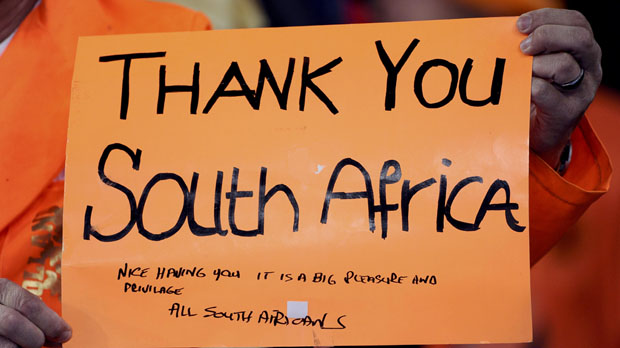What was the World Cup’s legacy for South Africa?
Great sporting events like the Olympics always promise a great legacy but do they deliver? We’ve been back to South Africa after the World Cup.
Do major sporting occasions leave permanent benefits?
With the London Olympics now only a year away, it’s becoming a crucial question for the country.
When South Africa hosted the football World Cup last year, it promised its citizens a lasting legacy.
But what of the legacy bequeathed by a month long sports festival – that cost nearly ten times what South Africa spent last year on tackling HIV?
Our sports reporter Keme Nzerem has been back to South Africa, to find out if it has delivered:
So now we know how much it finally cost – but what exactly did it leave behind. And at a price tag of over 40 billion rands – that’s about 4 billion pounds – was it really worth it?
Scenes of joy and football celebration like this say South Africa’s world cup organisers are priceless – for they’ve rebranded the nation that gave the world apartheid. A nation much of the outside world had associated with violence – now with cause to take pride.
When asked if they improved the image of South Africa Dr Danny Jordaan, the CEO of 2010 World Cup, answers with this:
“If you said South Africa – people used to say two things: Nelson Mandela and crime.
“Now they say Nelson Mandela and the World Cup.”
There’s now talk of bidding for the Olympics, and ask any football fan – hosting the world cup was a no brainer.

So new stadiums – albeit underused and often empty, jobs – although many of them temporary, new airports, and roads.
And the tourists – they’re still coming. To places like Vilakazi street in Soweto – once home to Nelson Mandela and Desmond Tutu. Yet just a few hundred yards up the road – the world cup was a bitter disappointment. small businesses say the authorities shut them out.
And how many tourists see the slums of South Africa?
Last summer, we were introduced to Sonelisile Sotshangane by a Soweto charity worker. He’s an Aids orphan living in a one room shack who’d been selected as a world cup mascot.
He’s still living in his one room shack.
He still doesn’t have running water – and he often goes to bed hungry. His brother says the government has long promised them new housing – but they’ve been badly let down. They thought the world cup was the start of better things to come.
“They made fools out of us – maybe in some future world cups they will make it better than last year?” – Theko Sotshangane
We now know this was FIFA’s most lucrative world cup ever – but the official legacy runs to just 20 artificial football pitches distributed across Africa, with some of the profits shared by African football authorities. Unrealistic grass roots expectations have been left unmet.
No one doubts football can be a route to achieving goals big and small. South Africa’s World Cup has come and gone. Brazil, the host of the next cup, has much to learn.